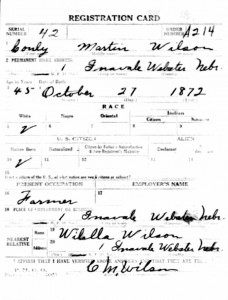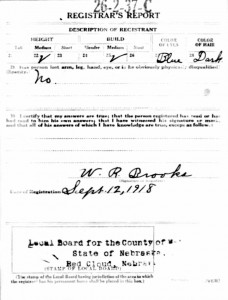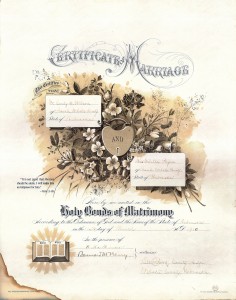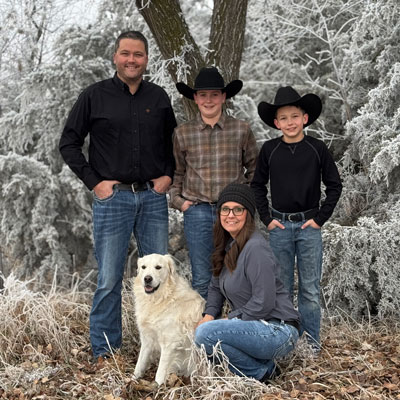Wilson
Conly M. Wilson & Wilella Payne Certificate of Marriage
Inavale Pioneer At 94 Still Doctoring Animals
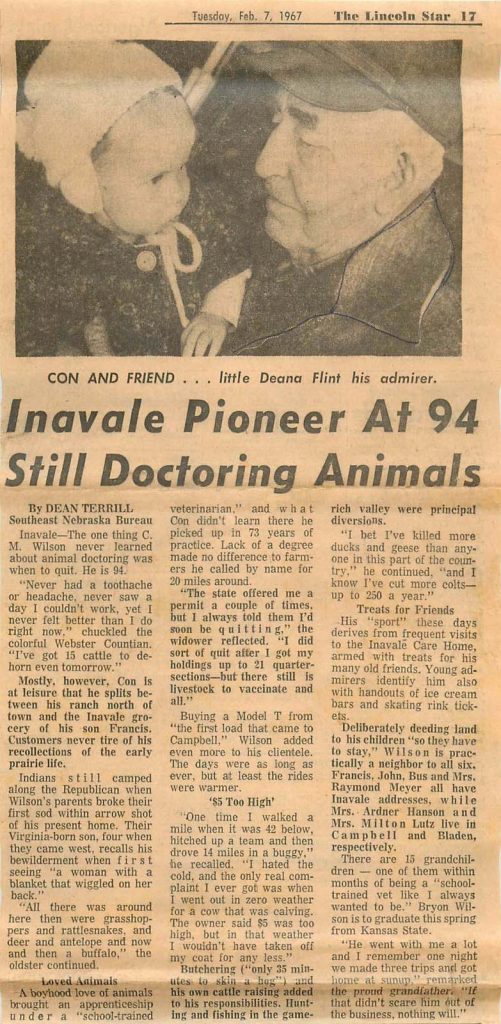 by Dean Terrill
by Dean Terrill
Southeast Nebraska Bureau
Inavale – The one thing C.M. Wilson never learned about animal doctoring was when to quit. He is 94.
“Never had a toothache or headache, never saw a day I couldn’t work, yet I never felt better than I do right now,” chuckled the colorful Webster Countian. “I’ve got 15 cattle to dehorn even tomorrow.”
Mostly, however, Con is at leisure that he splits between his ranch north of town and the Inavale grocery of his son Francis. Customers never tire of his recollections of the early prairie life.
Indians still camped along the Republican when Wilson’s parents broke their first sod within arrow shot of his present home. Their Virginia-born son, four when they came west, recalls his bewilderment when first seeing “a woman with a blanket that wiggled on her back.”
“All there was around here then were grasshoppers and rattlesnakes, and deer and antelope and now and then a buffalo,” the oldster continued.
Loved Animals
A boyhood love of animals brought an apprenticeship under a “school-trained veterinarian,” and what Con didn’t learn there he picked up in 73 years of practice. Lack of a degree made no difference to farmer he called by name for 20 miles around.
“The state offered me a permit a couple of times, but I always told them I’d soon be quitting,” the widower reflected. “I did sort of quit after I got my holding up to 21 quarter-sections – but there still is livestock to vaccinate and all.”
Buying a Model T from “the first load that came to Campbell,” Wilson added even more to his clientele. The days were as long as ever, but at least the rides were warmer.
‘$5 Too High’
“One time I walked a mile when it was 42 below, hitched up a team and then drove 14 miles in a buggy,” he recalled. “I hated the cold, and the only real complaint I ever got was when I went out in zero weather for a cow that was calving. The owner said $5 was too high, but in that weather I wouldn’t have taken off my coat for any less.”
Butchering (“only 35 minutes to skin a hog”) and his own cattle raising added to his responsibilities. Hunting and fishing in the game-rich valley were principal diversions.
“I bet I’ve killed more ducks and geese than anyone in this part of the country,” he continued, “and I know I’ve cut more colts – up to 250 a year.”
Treats for Friends
His “sport” these days derives from frequent visits to the Inavale Care Home, armed with treats for his many old friends. Young admirers identify him also with handouts of ice cream bars and skating rink tickets.
Deliberately deeding land to his children “so they have to stay,” Wilson is practically a neighbor to all six. Francis, John, Bus and Mrs. Raymond Meyer all have Inavale addresses, while Mrs. Ardner Hanson and Mrs. Milton Lutz live in Campbell and Bladen, respectively.
There are 15 grandchildren – one of them within months of being a “school-trained vet like I always wanted to be.” Byron Wilson is to graduate this spring from Kansas State.
“He went with me a lot and I remember one night we made three trips and got home at sunup,” remarked the proud grandfather. “If that didn’t scare him out of the business, nothing will.”
Source:
The Lincoln Star
Tuesday, Feb. 7, 1967
Con Wilson Interview
The following interview was recorded in 1965 for the Webster County Historical Museum. Fred Householder of the Bladen area was the interviewer. CM would have been around 92 years of age at the time of the interview, and later passed away at 94, just a couple months short of his 95th birthday.
Download Full Quality Audio File (256 kbps mp3 – 25 MB)
Interviewer: This recording is being made by Con Wilson for the Webster County Historical Museum.
Con: This is CM Wilson. I was born in Virginia in 1872, the 27th day of October. We came here to this country in ’75. We landed there in Hastings and stayed there all night and moved down here to this here old home place the next day.
Interviewer: How did you travel from Virginia to Hastings?
Con: We traveled from Virginia to Hastings – we came there on the train and we bought two horses in Hastings, an old lumber wagon, and moved down here in an old dugout.
Interviewer: Were you the only child in the family at that time?
Con: No. There was some girls and I, the elderly. Daisy, Dell, and I were born in Virginia when we came here.
Interviewer: Did your father pick a timber claim?
Con: Yeah, he took a timber claim. If I remember right, he took a railroad quarter, if I remember right.
Interviewer: And you say you moved into a dugout?
Con: Yeah, we moved into the dugout.
Interviewer: Had your father come before and made the dugout?
Con: Nope, nope, no. I had an uncle that was here and he had a place all ready for us when we got here.
Interviewer: What was your uncle’s name?
Con: My uncle was Albert Wilson and Clarence Wilson. They had _____ in the dugout.
Interviewer: And they had dug the dugout?
Con: Yeah, they had a dugout for us.
Interviewer: What was the first recollection that you have of this country? You were a little more than 2 years old when your folks came here.
Con: I was 3 years old.
Interviewer: What’s the first thing that you remember about the new country?
Con: Well, sir, I wasn’t but a, I don’t know what year it was in but dad took me to town with him one time, I went along with him. In those days all we had is rattlesnakes, deer, and we had both geese and ducks, and Indians, so dad took me along with him into Red Cloud that day and an ole girl there had a bump on her back and so I didn’t know what that bump was and once in awhile the thing would move a little bit and ______ something so I kept fooling around and that old Indian got between dad and me and I took a _____. I thought the old, I thought I was a goner, but it turned out to be alright.
Interviewer: What was that lump that you saw move?
Con: That Indian had a papoose.
Interviewer: What other early recollections do you have, Con? Were there other Virginians besides your own family that came at the time that your folks did?
Con: Oh yeah, I think, I couldn’t tell you for sure. I think Mr. Ramey, and Mr. Cather, Mr. Lockhart, they come here before we did.
Interviewer: Now you mention that your Uncle Clarence and Uncle Albert came before your folks did?
Con: Yeah, they come before we did.
Interviewer: How long before?
Con: Well, I think they, I won’t say for sure, we came here, if I remember, in the spring and they was here they come here in the fall.
Interviewer: Did all 3 of the Wilsons, your 2 uncles and your father all settle here in Catherton Precinct?
Con: They what?
Interviewer: Did they all take claims or timber claims here in Catherton?
Con: __________ took a claim and dad he had 2 claims, had 2 quarters, and Uncle Albert had 1 quarter.
Interviewer: Uncle Albert was the one that was drowned later.
Con: Say what?
Interviewer: Your Uncle Albert was the one that was drowned?
Con: Yeah, right there on the quarter he had.
Interviewer: Oh, yes, I remember that.
Con: Yeah.
Interviewer: What other settlers were here when your folks came, in this immediate vicinity?
Con: The _____ Mr. Cather was here and Mr. George Cather and his wife was here and I, they had a couple-three kids here. Then Charlie Cather came, he must have come a year or two later and they lived on the quarter, they have the quarter yet today, that’s where they lived. Old Mr. Cather come and his wife came here and I believe one of his sisters, sisters of George Cather.
Interviewer: That would have been _________.
Con: There was 2 of them, I don’t know for sure.
Interviewer: Were there other – how about the Coopers and the Markers?
Con: Oh, they came later.
Interviewer: Do you remember where your folks got their mail when they first came?
Con: Well, I tell you, let me think a little bit.
Interviewer: The Otto Post Office, was that organized?
Con: Who?
Interviewer: The Otto Post Office, was that organized, was that?
Con: Now just wait a minute. That post office, if I remember right, I think the first mail we had came out of here is over here, Cooper’s had the post office and Mr. Payne, Mr. Ed Payne, I think he had that post office first and then the Coopers got it and took and run it then it went up to Petersons.
Interviewer: Did Mrs. Marker have it for a year or so?
Con: Huh?
Interviewer: Did Mrs. Marker have it for a year or so?
Con: Yeah, he had the post office there too, I forgot about them. They had a post office there for awhile.
Interviewer: What other area recollections do you have, Con, of the country? Where did you go to school?
Con: I went to school where the school house is right now.
Interviewer: The New Virginia School?
Con: Yes, sir.
Interviewer: Do you remember who your first teacher was?
Con: Yes, sir. She was Mrs. Grubbs.
Interviewer: Is that right.
Con: And then the next teacher we had was Mrs. Rice.
Interviewer: And, when did you start veterinary work in the county, Con?
Con: 71 years ago.
Interviewer: 71 years ago?
Con: Yes, sir.
Interviewer: And you still are doing veterinary work, aren’t you?
Con: Some, oh just a little bit, not much.
Interviewer: Isn’t that a state record?
Con: Huh?
Interviewer: Isn’t that a state record?
Con: No, I don’t know that it is, I expect it is of course. I traveled from __________ out of my drive, north and south, there’s no limit to it, traveling to Lebanon to up to Holstein.
Interviewer: From Lebanon to Holstein, from south to north, and what dimension from east to west?
Con: Well, that there’s from Bostwick to Bloomington.
Interviewer: From Bostwick to Bloomington, you’ve covered all that area?
Con: For 71 years.
Interviewer: That’s a remarkable record I’d have to say, Con. Have you enjoyed working with the farmers in all those 71 years?
Con: Huh?
Interviewer: Have you enjoyed working with the farmers in all that 71 years?
Con: It couldn’t be no better.
Interviewer: You’ve enjoyed it?
Con: Yes, sir. I did. All of them treated me the best in the world. Very few of them, very, very few of them wasn’t the best in the world.
Interviewer: That’s fine, Con. Who were some of the younger people who went to school when you did?
Con: _____ Marker had, he had 2 or 3 kids, and Lambrecht’s had kids, all 3 of them, had boys and girls too. That was Henry Lambrecht, George Lambrecht, and brother all went to school there together.
Interviewer: About how many people were in school when you
Note:
At this point the tape cut off. We presume that the original interview was recorded on reel-to-reel media and was not fully transferred to the cassette tape that was used for this transcription or the audio capture.
Source:
Transcribed from cassette tape by Joyce Terhune, Director WCHM – June 11, 2008
Audio digitally captured from cassette tape by Wade Gibson – December 21, 2012
Final services for Wilella Wilson
Wilella, daughter of Francis Edward and Alverna Cather Payne, was born near Inavale May 1,1882. Her entire life was lived in Webster County where she attended our local school in preparation for the training received in the Grand Island college.
Tragedy struck early in her life in the loss of her mother. Her grandparents, William and Caroline cather, cared for this 18 month old baby as well as making a home for the half-brother, Kyd Clutter, and the cousin Retta Ayer who was also motherless.
On reaching maturity, she assumed the responsibility of homemaking for her father who lived on a farm north of Inavale.
March 15, 1910, she was married to Conley Martin Wilson. Four sons and three daughters were born to them.
Preceding her in death was one son, Charles Richard, who passed away at five years of age.
Remaining to mourn the loss of this loved one are her husband, daughters, Verna Lutz, Retta Hanson, Edna Meyer and her sons James, Frances and Johnny.
Source:
Red Cloud Commercial Advertiser
April 1960
